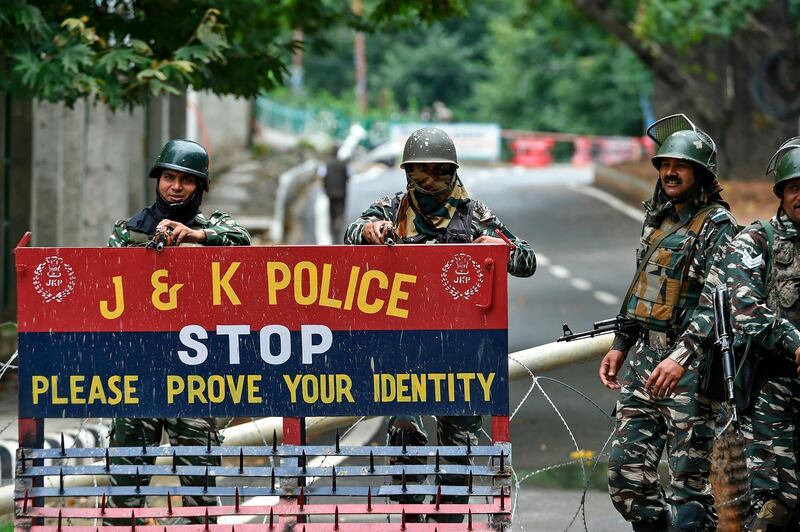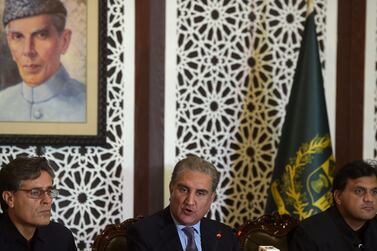After 13 days of a communication blackout and strict restrictions on civilian movement in Indian-administered Kashmir, the government on Saturday began to reconnect telecoms by opening 17 of the 100 landline exchanges around the valley.
Since August 5, when the Bharatiya Janata Party-led central government revoked the special status of the state of Jammu and Kashmir, phone lines were cut, the internet shut off and movement restricted in the newly created union territories of Jammu and Kashmir, and Ladakh.
Fearing an angry and potentially violent response, it also sent 10,000 extra troops to the area and imposed severe restrictions on movement.
In a joint press conference by government spokesperson Rohit Kansal, the inspector general of police Swayam Prakash Pani and public relations director Sehrish Asgar said that the restrictions had been relaxed in 35 police districts in parts of the Kashmir Valley.
Mr Kansal also said that the decision was taken after "closely monitoring the situation on the ground".
But in the old town of the region's capital of Srinagar, the strict restrictions preventing any civilian movement were still in effect.
In the city centre, Lal Chowk, the shutters of most shops stayed closed.
A local convenience store owner, Showkat Mir, 26, said: “We didn’t open the main door, fearing the situation. We have been operating via the back door to facilitate people in an emergency.”
A few other general stores also opened a back door to allow people to grab emergency supplies.
At the end of a lane in the centre, Mohammad Yaqoob, 45, who owns a small general store, sat despondently.
“I didn’t open it for business,” he says. “I opened it for the people so that they can buy [their] daily needs,” he said, handing a packet of cigarettes to a young man.
“Kashmir is in a war-like situation. Here, the matter isn’t about where restrictions were lifted or communication channels opened – this time it is about our identity.
“People aren’t opening shops out of protest. It is the civil disobedience.”
On Friday, the District Development Commissioner, Shahid Chowdhary, tweeted to say that restrictions would be lifted in most parts of Srinagar. He also urged people to not start “panic shopping”.
The state’s Chief Secretary, BVR Subrahmanyam, had said on Friday there would be a “gradual” restoration of phone lines over the weekend.
He also said, though, that those overseeing the easing of restrictions would keep in mind “the constant threat posed by terrorist organisations in using mobile connectivity to organise terrorist actions”.
Shadhab Khan, 45, a jewellery shop owner, sat alone.
“Earlier, we didn’t open shop because of restrictions,” he said. “Now, it is our protest.”
He said that with all the political leaders detained or under house arrest, “Kashmiris are in a boat, sailed by wind and mood of the people.”
Mr Khan said he only came to the shop to finish an order placed by a bride to be and to check if the landline had been reconnected.
“My landline didn’t open,” he said. “Did yours?”
He said that being forced to close his shop had cost him some of the best trade days of the year, around the Eid holidays, last week.
On Friday in Srinagar, several hundred protesters clashed with police, who responded by firing tear gas and shotgun pellets.
Protesters threw stones and used shop hoardings and tin sheets as improvised shields, as police shot dozens of rounds into the crowd.
On Saturday, Indian security forces said at least six people had been injured in protests in Srinagar.
The clashes broke out as more than 3,000 people rallied in the Srinagar locality of Soura, where regular protests have occurred since New Delhi’s surprise move on August 5.
A week earlier, about 8,000 people staged a protest, with police also responding with tear gas and pellets, residents said.
“We want peace and nothing else but they have kept us under this lockdown like a sheep while taking decisions about us,” said resident Tariq Madri.
“Even my nine-year-old son asked me why they had locked us inside,” he said.
By the weekend, some traffic had begun returning to the roads running past the shuttered shops.
In nearby Jammu, the sister region of Kashmir valley, the situation was improving more quickly. All landline services were working as usual and mobile services were restored in its five districts.
Government offices across the valley opened on Friday and schools were told they could open from Monday.
Kashmir has been divided between India and Pakistan since independence from Britain in 1947, and has been the spark for two major wars and countless clashes between them.
In the Indian part, since 1989 tens of thousands of people, most of them civilians, have died in an insurgency against New Delhi’s rule that India blames on Pakistan.
On Friday the United Nations Security Council met behind closed doors in New York at the request of Pakistan and China, the first meeting to discuss Kashmir since 1971.
Pakistan’s ambassador hailed it as evidence that the region’s troubles were an “internationally recognised dispute”.
But India’s envoy Syed Akbaruddin expressed annoyance over any outside help or suggestions.
“We don’t need international busybodies to try to tell us how to run our lives. We are a billion-plus people,” he said.
US President Donald Trump again urged the nuclear-armed rivals to come back to the negotiating table, conveying by phone to Pakistani Prime Minister Imran Khan the importance of “reducing tensions”.
Additional reporting by agencies.






